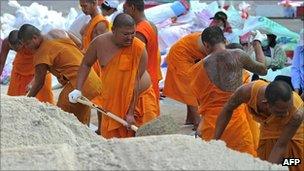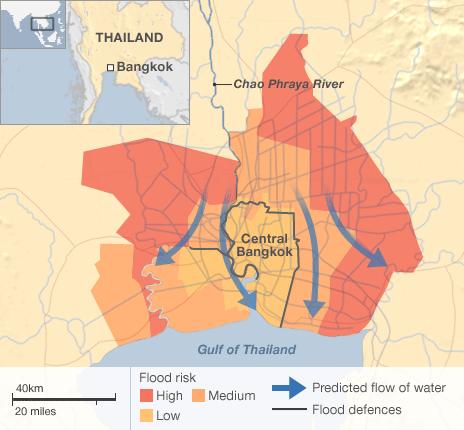Thailand flooding: Bangkok districts put on alert
- Published
The BBC's Rachel Harvey said seven districts of Bangkok have been put on alert
Residents of seven districts of Bangkok have been told to move valuables to higher ground and be ready to evacuate, as flooding which has swamped northern Thailand approaches the capital.
More than 300 people have been killed in the worst flooding to hit the country in decades.
The army and volunteers are working to shore up flood defences in Bangkok but there are fears barriers will not hold.
Officials said earlier this week that the capital would be safe.
The government of Prime Minister Yingluck Shinawatra has been criticised for giving what many in Thailand say has been unclear or conflicting information about the disaster.
At a news briefing on Wednesday, Ms Yingluck - who came to power in August with relatively little political experience - said her government had "done everything to the best of our ability" and asked for support from the public and media.
"I have left no stone unturned in this crisis but I cannot solve it alone," she said.
"We are facing the most severe flooding ever. We need encouragement, support and co-operation from all sectors and from all the people as well."
She urged people to "set aside politics" and work together to restore morale, and insisted the government was not concealing any information from the public.
'Be prepared'
The northern Thai provinces of Ayutthaya, Pathum Thani and Nakhon Sawan have already been devastated by flooding.
The Bangkok districts now on alert are Sai Mai, Khlong Sam Wa, Bang Khen, Nong Jok, Min Buri, Lat Krabang and Kan Na Yao, all to the north of the capital.
The Thai air force has moved some of its planes from Don Muang international airport, by Sai Mai district, as a precaution.

Buddhist monks have joined efforts to fill sandbags and shore up flood defences
Bangkok is criss-crossed by small waterways, and the warning came after several key sluice gates were opened to allow water to flow into the major Rangsit canal, which runs from the Chao Phraya river through Patum Thani.
Some 1.2bn cubic metres of water was expected to enter the Rangsit canal, said Bangkok Governor Sukhumbhand Paribatra.
"So, we need to tell the people to get prepared," Mr Sukhumbhand said.
He told residents not to panic, but to move their belongings to upper floors and unplug electrical appliances - an evacuation plan has been put place and 156 emergency shelters set up, he said.
Thai soldiers and civilians have been working frantically to shore up sandbag defences but the pressure of water has burst through the barricades in places.
Officials say another two million sandbags will be needed over the next few days.
"This point is critical. If the water rises higher than our flood barriers, which is going to be at 1.8-2m now, the water will flow into the Muang Ake area," said Soradaj Pyakarn, a military adviser.
Five industrial estates have been abandoned - putting tens of thousands of people temporarily out of work.
At least 315 people have been killed and tens of thousands left homeless in the floods, which have inundated two-thirds of the country since July. A third of Thai provinces remain under water, reports suggest.
"I think the government should work faster and make a quick decision," said one man in the capital, Nattapon Dachasawas. "This is the main gateway to Bangkok. They must do it quickly."
Analysts say the floods - which have hit the country's extensive manufacturing infrastructure - are likely to cut annual economic growth by more than one percentage point, but this could double if Bangkok is badly hit.

- Published15 October 2011
- Published13 October 2011
- Published11 October 2011
- Published11 October 2011